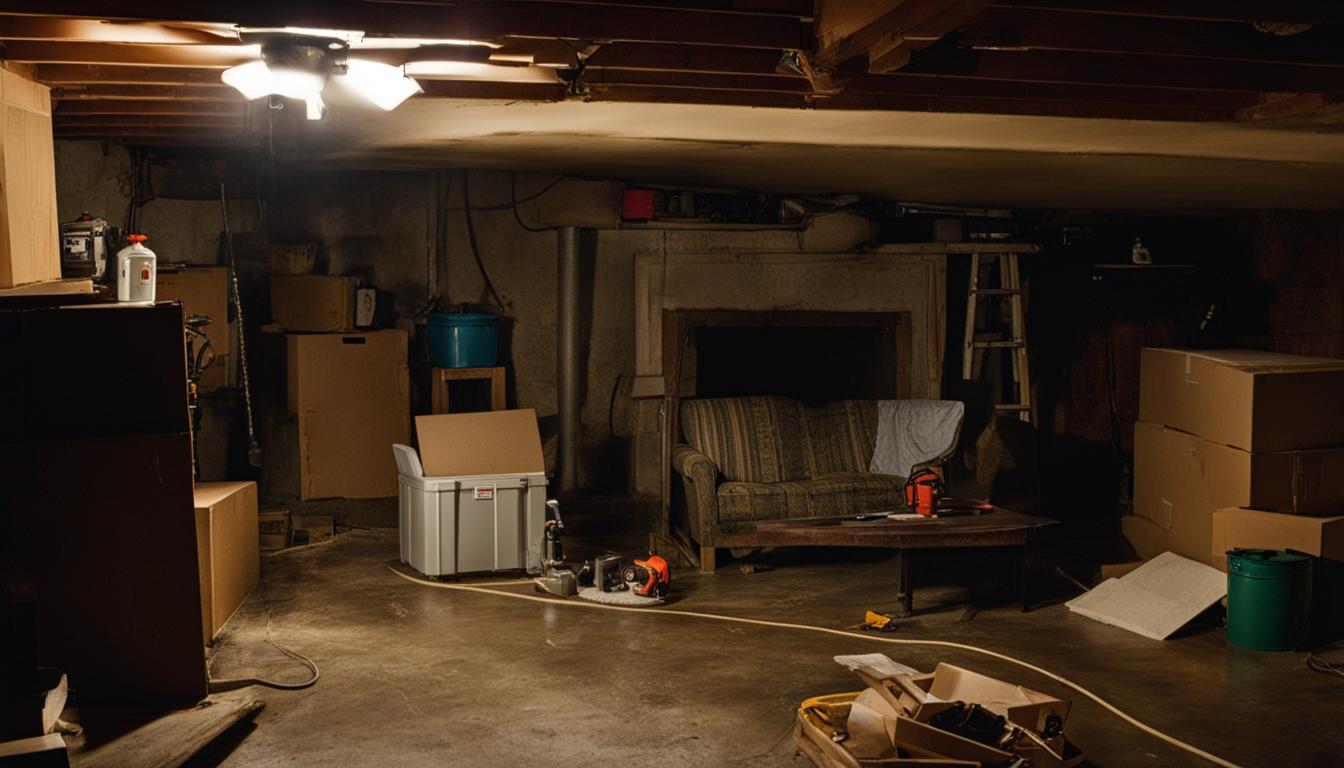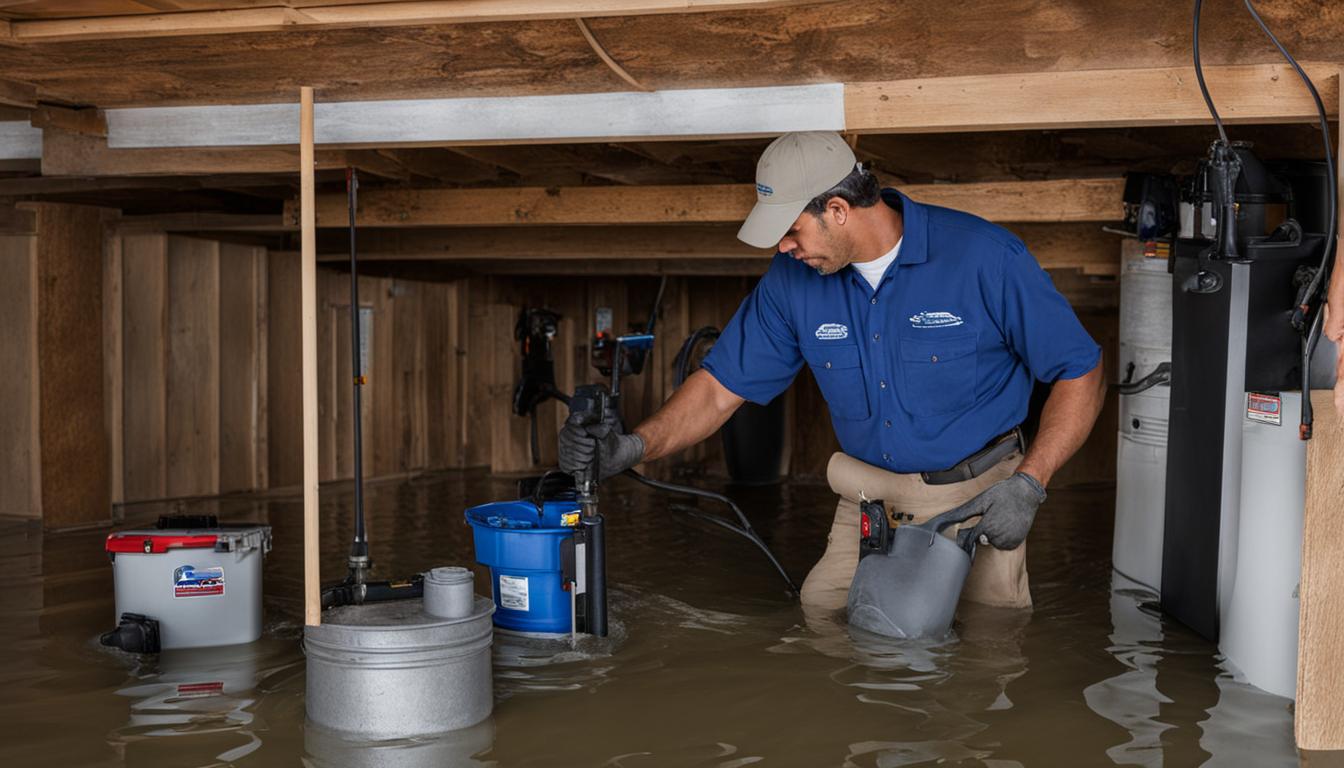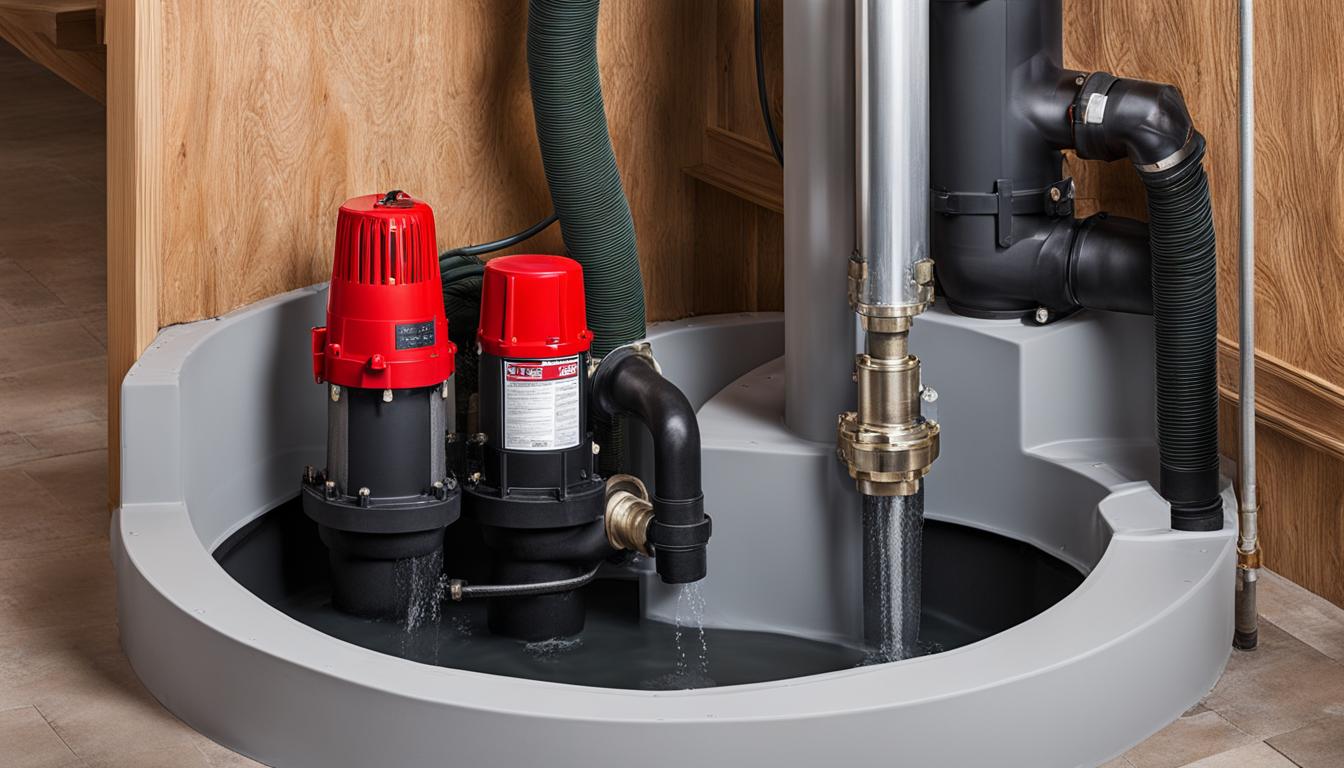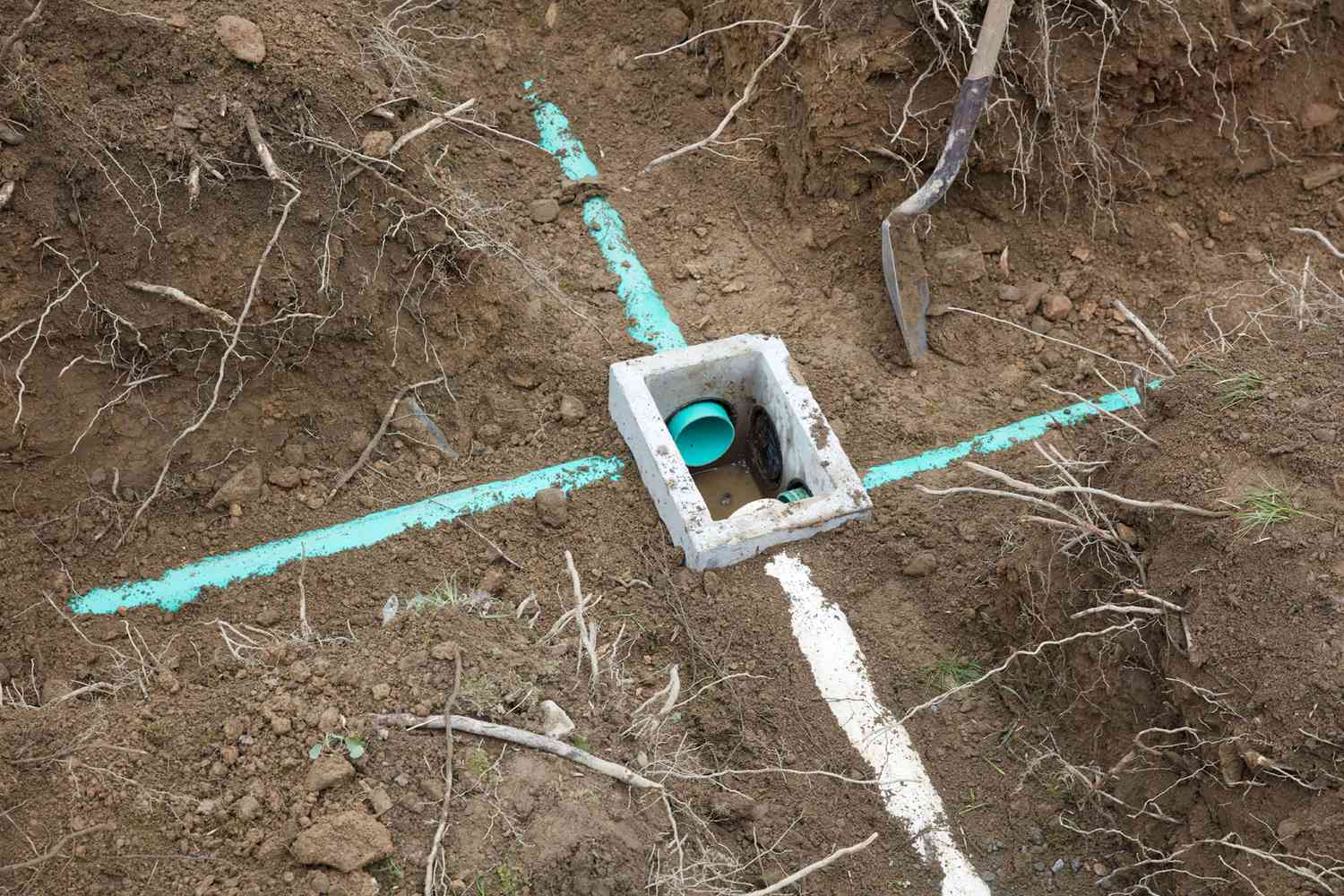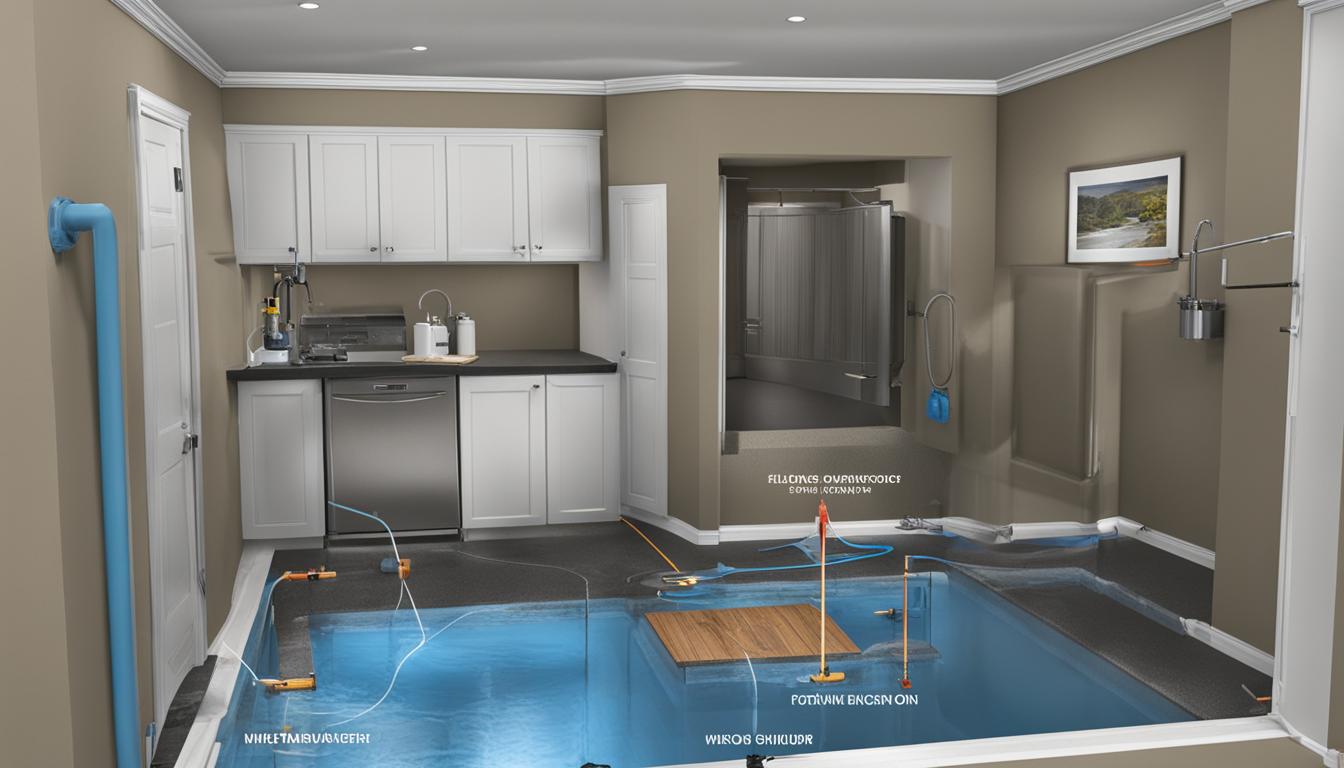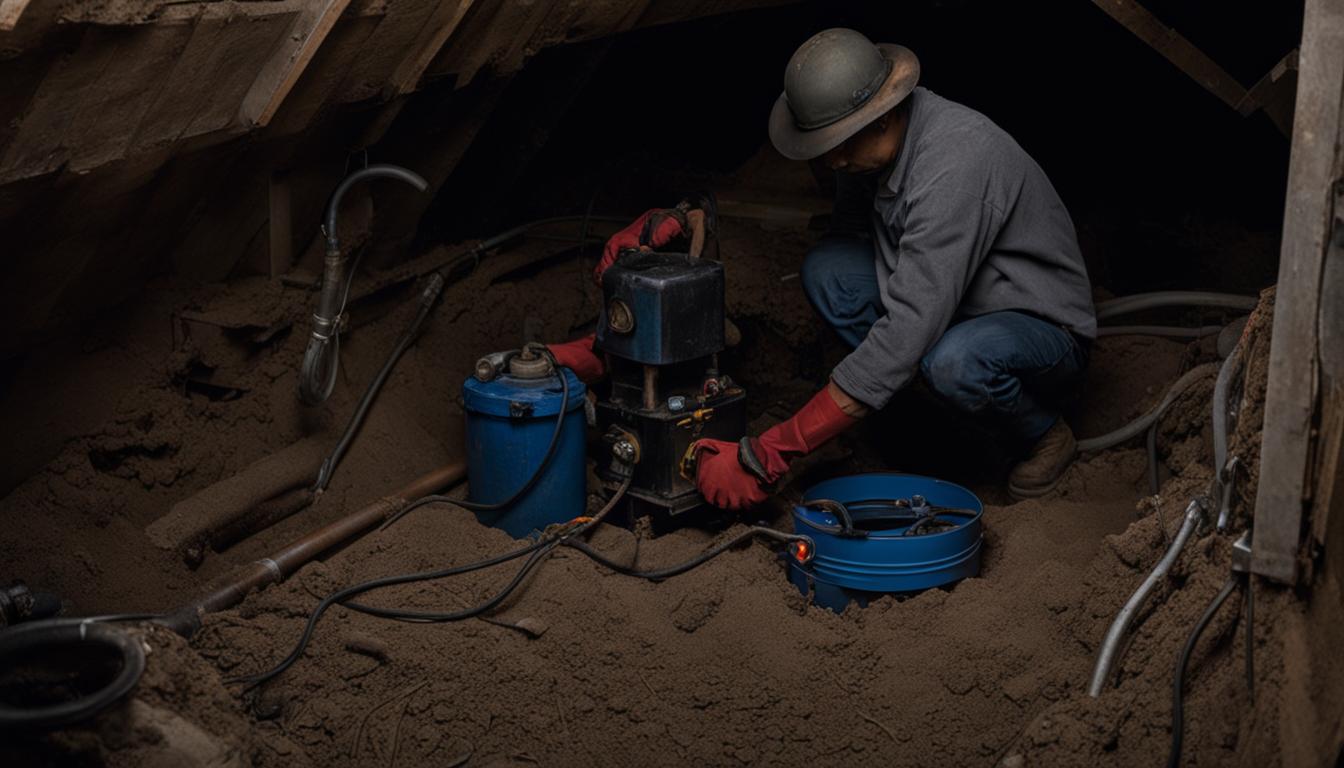As homeowners, protecting our investment is one of our top priorities. One of the most significant threats to our homes is water damage, and basements are especially susceptible. Moisture control is essential to prevent leaks, mold, and other water-related issues. That’s why basement waterproofing and sump pump integration are essential components of a comprehensive home protection plan.
In this section, we will explore the benefits of basement waterproofing and sump pump installation. We will also discuss the importance of moisture control and the various methods available to keep your basement dry.
Key Takeaways
- Basement waterproofing is crucial in preventing water damage and mold growth.
- A sump pump is an essential component of a comprehensive basement waterproofing system.
- Moisture control is necessary to prevent leaks and other water-related issues.
- Various waterproofing methods are available, including exterior excavation, interior sealants, and damp proofing.
- Assessing your basement’s specific needs is crucial to determine the most effective solutions.
Understanding the Risks of Basement Moisture
Before we dive into the process of waterproofing your basement, it’s essential to understand the risks associated with basement moisture. When left unchecked, water intrusion can cause significant damage to your home, leading to costly repairs and health hazards.
Common Causes of Basement Leaks
Basement leaks can occur due to various reasons. Here are some of the most common causes:
| Cause | Impact |
|---|---|
| Cracks in foundation walls or floors | Allow water to seep in and weaken the structure |
| Poor drainage or grading around the foundation | Causes water to accumulate and seep into the basement |
| Inadequate sealing around windows or doors | Allows water to penetrate the basement through gaps and cracks |
Regardless of the cause, it’s crucial to take preventative measures to control moisture and prevent leaks.
The Importance of Water Barriers
Installing water barriers is one of the most effective ways to prevent water intrusion. These barriers can be applied on the exterior or interior of the foundation walls and floor to prevent moisture from seeping in.
Exterior waterproofing involves excavating around the foundation and applying a membrane to the walls and floor. Interior waterproofing, on the other hand, involves applying a sealant to the walls and floor from the inside. Both methods can be effective, but external waterproofing is often considered a more thorough solution.
Controlling Moisture in Your Basement
Controlling the moisture levels in your basement is crucial to prevent leaks and mold growth. Here are some tips to help you control moisture:
- Ensure proper ventilation by opening windows or installing a dehumidifier
- Fix any leaks or drips from plumbing or appliances immediately
- Regularly inspect your basement for signs of moisture or leaks
By taking these preventative measures, you can significantly reduce the risk of basement leaks and the associated damage.
Choosing the Right Waterproofing Methods
When it comes to waterproofing your basement, there are various methods available, each with its own advantages and disadvantages. The right choice for your basement depends on factors such as the age of your home, the location of your property, and the severity of the moisture problem.
Damp proofing is one of the most common waterproofing methods, which involves applying a thin layer of a specialized material to the interior or exterior walls and floors of the basement. This material acts as a moisture barrier, preventing water from seeping through the foundation and into the basement. While damp proofing is an effective method of controlling minor moisture problems, it may not be suitable for more severe cases.
Exterior excavation involves digging around the perimeter of your foundation to apply a waterproofing membrane directly to the exterior walls. This method provides comprehensive protection against water intrusion but can be costly and disruptive to your yard and landscaping.
Interior sealants are another popular option, which involve applying a coating or sealant to the interior walls and floors of the basement. While this method is cost-effective and minimally invasive, it may not be suitable for severe moisture problems or high water tables.
To ensure the most effective solution for your basement, we recommend consulting with a professional waterproofing contractor who can evaluate your property and recommend the best approach for your specific needs.
Damp Proofing vs. Waterproofing: What’s the Difference?
While they may sound similar, damp proofing and waterproofing are two different methods of moisture control.
Damp proofing involves applying a water-resistant layer to the interior or exterior walls and floors of the basement to prevent minor moisture problems.
Waterproofing, on the other hand, involves creating a comprehensive moisture barrier to prevent water intrusion and protect your home’s foundation from damage.
While damp proofing may be suitable for minor moisture problems, we recommend waterproofing for more severe cases, as it provides a more comprehensive and long-lasting solution for your home’s protection.
Sump Pump Installation: An Integral Component
When it comes to waterproofing your basement, sump pump installation is an integral component that works hand in hand with other methods to prevent leaks and control moisture. This system is designed to collect excess water that may enter your basement and pump it out before it causes any damage to your home.
Without a sump pump, other waterproofing methods such as damp proofing or interior sealants may not be enough to prevent leaks in cases of heavy rain or flooding. The sump pump helps to manage the excess water to ensure your basement remains dry and protected.
When combining several waterproofing methods, it’s crucial to integrate a sump pump system to provide a comprehensive solution that safeguards your home against water damage. The sump pump installation is typically conducted after other waterproofing measures are in place.
There are different types of sump pumps available, including pedestal and submersible options. Your choice may largely depend on the size of your basement and the amount of water it’s likely to accumulate.
How a Sump Pump Works
A sump pump works by collecting water in a basin or sump pit, which is typically dug out in the lowest part of your basement to collect excess water. Once the water reaches a certain level in the basin, the sump pump is automatically triggered to pump the water out of the house through a discharge pipe.
The discharge pipe is usually directed away from the foundation of your house, either to a municipal storm drain or another appropriate outlet. This helps to ensure that the water is entirely removed from your home, and it doesn’t flow back into your basement.
The Importance of Sump Pump Integration for Leak Prevention
Sump pump integration is crucial in leak prevention because it helps to manage excess water in your basement, which is one of the leading causes of leaks. The sump pump system provides an added layer of protection for your basement, especially during heavy rainfall or flooding.
In cases of power outages, many sump pumps come with a battery backup system to ensure they continue to function and protect your home even when the electricity goes out. This is an added benefit that provides peace of mind to homeowners, knowing that their basement remains protected no matter the circumstances.
Overall, a sump pump system is an essential component when waterproofing your basement. When combined with other waterproofing measures such as water barriers and exterior grading, you can create a comprehensive solution that ensures your basement remains dry and protected.
Evaluating Your Basement’s Needs
At the heart of an effective basement waterproofing system is the installation of water barriers. By creating a physical barrier between your home and the outside, you can prevent water intrusion and protect against leaks. But before deciding on the right water barrier for your basement, it’s essential to evaluate its specific needs.
Assessing Vulnerability to Leaks
Several factors can determine a basement’s susceptibility to leaks, including its location in relation to the water table, the quality of the foundation, and the surrounding landscaping.
For example, basement areas located near the water table may be more vulnerable to water infiltration, while homes with sloping ground around the foundation may require additional measures to divert water away from the building.
By evaluating your basement’s potential weaknesses, you can determine which water barriers or basement waterproofing methods will be most effective in preventing leaks before they occur.
Synergizing Installation Methods
While installing a water barrier is an essential step in basement waterproofing, combining it with other installation methods can enhance overall effectiveness. For instance, installing both an interior and exterior water barrier can provide double protection against water intrusion. Additionally, pairing water barriers with a sump pump system can help ensure proper water drainage and prevent any buildup that could lead to leaks.
Professional Inspection and Assessment
At times, it may be challenging for a homeowner to objectively assess their basement’s waterproofing needs. In these cases, it’s best to seek out professional inspection and assessment. With their experience and expertise, waterproofing professionals can provide a comprehensive evaluation of your basement’s needs and recommend the most effective solution.
By taking the time to evaluate your basement’s unique needs, you can make an informed decision on the right water barriers and basement waterproofing methods to keep your home dry and protect against costly water damage.
Professional Waterproofing Services
Basement waterproofing is a complex and crucial process that requires experience and expertise. That’s why seeking professional assistance is highly recommended to ensure an effective, long-lasting solution for your home. At [company name], we provide comprehensive waterproofing services tailored to your basement’s specific needs.
The Benefits of Professional Waterproofing Services
By choosing our services, you can benefit from:
| Benefits | Description |
|---|---|
| Expertise and Experience | Our professionals have years of experience in the industry and are equipped with the latest tools and techniques to deliver the best results. |
| Customized Solutions | We evaluate each basement’s unique needs and provide tailored solutions that address the specific problems and vulnerabilities. |
| Quality Materials and Products | We use high-quality materials and products that are designed to withstand moisture and prevent leaks, ensuring a long-lasting solution. |
| Guaranteed Workmanship | We stand behind our work and offer a guarantee for our waterproofing services, giving you peace of mind and confidence in the investment. |
Additionally, our professional services can help you achieve installation synergy, meaning the integration of multiple waterproofing methods to provide comprehensive protection against moisture. We can evaluate your home’s specific needs and recommend the most effective combination of waterproofing methods to ensure maximum home protection.
Overall, investing in professional basement waterproofing services can save you time, money, and stress in the long run, as it ensures a thorough and effective solution that prevents costly water damage and enhances your home’s value and comfort.
The Steps of Basement Waterproofing and Sump Pump Installation
At [Company Name], we follow a thorough process for basement waterproofing and sump pump installation. Our experts will assess your basement’s specific needs to determine the most effective solutions for moisture control. Here are the essential steps we follow:
- Identifying problem areas: We inspect your basement thoroughly to identify areas of moisture intrusion and leaks. This step helps us determine the right waterproofing methods and sump pump installation.
- Water barrier installation: We install water barriers around the interior foundation walls to prevent water intrusion. This step involves excavation along the perimeter of the basement walls to create a trench, which is then filled with gravel and drain tile. The water barrier is then installed to cover the trench and direct water to the sump pump.
- Sump pump installation: We install the sump pump in the lowest part of the basement to collect water from the drain tile and pump it out of the house. Our experts ensure proper positioning, plumbing, and electrical connections for efficient sump pump operation.
- Exterior waterproofing: In some cases, we may recommend exterior waterproofing methods to complement interior solutions. This step involves excavating around the exterior foundation walls, applying a waterproof sealant, and installing a drainage system to direct water away from the house.
- Combined solutions: Depending on your basement’s specific needs, we may recommend combining waterproofing methods such as interior sealants and exterior waterproofing for enhanced protection against leaks and moisture intrusion.
By following these steps, we ensure that your basement is thoroughly waterproofed, preventing water damage and mold growth. Our experts also provide essential maintenance tips to prolong the lifespan of your waterproofing system and sump pump.
Maintaining Your Waterproofed Basement
Now that your basement is waterproofed and equipped with a sump pump, proper maintenance is essential to ensure that your investment continues to protect your home. Moisture control and leak prevention are key to maintaining a dry and safe basement, and the following tips will help you do just that:
- Monitor Your Sump Pump: Regularly check your sump pump to ensure that it’s functioning correctly, and remove any debris or sediment that may have accumulated in the pit. If you notice any issues, such as strange noises, it’s best to contact a professional for assistance.
- Seal Any Cracks: Check for any cracks or gaps in your foundation or walls and seal them promptly to prevent water intrusion. Cracks can be sealed using hydraulic cement, epoxy injection, or polyurethane foam, depending on the severity.
- Check for Standing Water: Keep an eye out for any standing water in your basement and address the source immediately. This could be due to a leaky pipe, a malfunctioning appliance, or excess humidity.
- Ensure Proper Ventilation: Proper ventilation is essential to prevent excess humidity in your basement. Ensure that your dryer vent exhausts to the exterior of your home and that your bathroom and kitchen fans are functioning correctly.
- Maintain Your Gutters and Downspouts: Clean your gutters and downspouts regularly to ensure that they’re functioning correctly. This will help prevent water from pooling around your home’s foundation and seeping into your basement.
- Consider a Dehumidifier: If you live in an area with high humidity, consider investing in a dehumidifier to keep your basement dry and comfortable.
By following these tips, you can prolong the lifespan of your waterproofed basement and sump pump system, ensuring that your home remains protected against water damage and leaks. Remember, proper maintenance is crucial, and regular inspections and repairs will help you keep your basement dry and comfortable for years to come.
Additional Measures for Enhanced Protection
While basement waterproofing and sump pump installation are crucial steps in preventing moisture intrusion, there are additional measures homeowners can take to enhance their protection against leaks and water damage. These measures include:
| Measure | Description |
|---|---|
| French Drains | A French drain is a trench filled with gravel or rock that redirects surface and groundwater away from your home’s foundation. It helps prevent water from accumulating around your basement walls, reducing the risk of leaks and seepage. |
| Exterior Grading | Proper exterior grading ensures that the ground around your home slopes away from your foundation, directing water away from your basement walls. This can be achieved by adding soil or reshaping existing landscaping. |
| Foundation Crack Repairs | Foundation cracks can allow water to seep into your basement, so it’s crucial to repair any cracks as soon as they’re detected. A professional waterproofing service can inspect your foundation and make any necessary repairs. |
By combining these measures with quality waterproofing and sump pump installation, homeowners can ensure comprehensive protection against basement moisture intrusion. It’s essential to evaluate your specific needs and work with experienced professionals to determine the most effective combined solutions for your home.
The Benefits of Waterproofing Your Basement Alongside Sump Pump Installation
Investing in basement waterproofing alongside sump pump installation offers numerous benefits and ensures a dry and secure basement for years to come. Let’s take a closer look at the advantages.
Leak Prevention
Basement waterproofing methods, like damp proofing and sealants, work together to prevent leaks and water intrusion. A sump pump system also serves as a backup plan in case a leak does occur. By waterproofing your basement and installing a sump pump, you can have peace of mind knowing your home is protected against costly water damage.
Improved Indoor Air Quality
Water intrusion and moisture buildup in your basement can lead to mold and mildew growth, which can negatively impact your indoor air quality. By investing in effective basement waterproofing methods and a sump pump, you can prevent the growth of harmful fungi, thus improving your home’s overall air quality.
Increased Home Value
Waterproofing your basement can add value to your home. Not only does it ensure the integrity of your home’s foundation, but it also creates an additional living and storage space that’s attractive to potential buyers. A dry, functional basement is a valuable asset to any home.
Protection Against Costly Water Damage
Water damage can be expensive to repair and can lead to other issues, such as mold growth and structural damage. Investing in basement waterproofing alongside a sump pump system can prevent costly water damage, saving you money in the long run.
Effective Damp Proofing
Damp proofing is a crucial aspect of basement waterproofing that involves the placement of a moisture-resistant barrier on walls and floors to prevent water intrusion. Effective damp proofing methods, like exterior excavation and interior sealants, can keep your basement dry and safe from water damage.
Overall, waterproofing your basement alongside sump pump installation is a worthwhile investment in protecting your home from water damage, improving indoor air quality, increasing home value, and ensuring effective damp proofing. Don’t wait until it’s too late to take action. Contact us today to discuss your basement waterproofing needs.
Conclusion
As we conclude, we understand the importance of waterproofing your basement and installing a sump pump system to prevent moisture and water damage. Through this article, we have explored the common risks associated with basement moisture and the different methods of waterproofing your basement.
Choosing the right waterproofing technique and evaluating your basement’s needs is crucial in ensuring effective moisture control. Additionally, integrating a sump pump system is a vital component that goes hand in hand with other waterproofing methods to keep your basement dry.
While some homeowners may attempt to DIY their waterproofing solutions, we highly recommend seeking professional assistance to ensure a thorough and comprehensive solution. Once your basement is waterproofed and a sump pump system is installed, proper maintenance is key to ensure their effectiveness.
Additional measures such as French drains, exterior grading, and foundation crack repairs can further enhance the protection of your basement against water damage. Investing in these measures offers numerous benefits, including increased home value, improved indoor air quality, and protection against costly water damage.
Choose Us for Comprehensive Basement Waterproofing
We at XYZ Waterproofing are dedicated to providing comprehensive basement waterproofing solutions that cater to your specific needs. Our experienced team of waterproofing experts offers various methods, including damp proofing, exterior excavation, and interior sealants. We also specialize in sump pump system installation to provide you with complete moisture control.
Contact us today for a thorough evaluation of your basement’s needs and let us provide you with a long-lasting solution to keep your basement dry and secure for years to come.
FAQ
Why is basement waterproofing important?
Basement waterproofing is important because it helps prevent moisture from entering your basement, which can lead to issues such as mold growth, structural damage, and water damage to your belongings.
What are the common causes of basement leaks?
Common causes of basement leaks include cracks in the foundation, poor drainage, hydrostatic pressure, and inadequate waterproofing.
What are the benefits of sump pump installation?
Sump pump installation helps prevent basement flooding by efficiently removing water that accumulates in the sump pit. It provides an extra layer of protection against water damage.
How do I choose the right waterproofing method for my basement?
Choosing the right waterproofing method for your basement depends on factors such as the source of the moisture, the severity of the issue, and your budget. It is recommended to consult with a professional waterproofing expert to determine the most suitable solution.
Can I waterproof my basement myself?
While some homeowners may choose to tackle basement waterproofing as a DIY project, hiring professional waterproofing services ensures a more thorough and long-lasting solution. Professionals have the experience and expertise to identify and address specific issues effectively.
